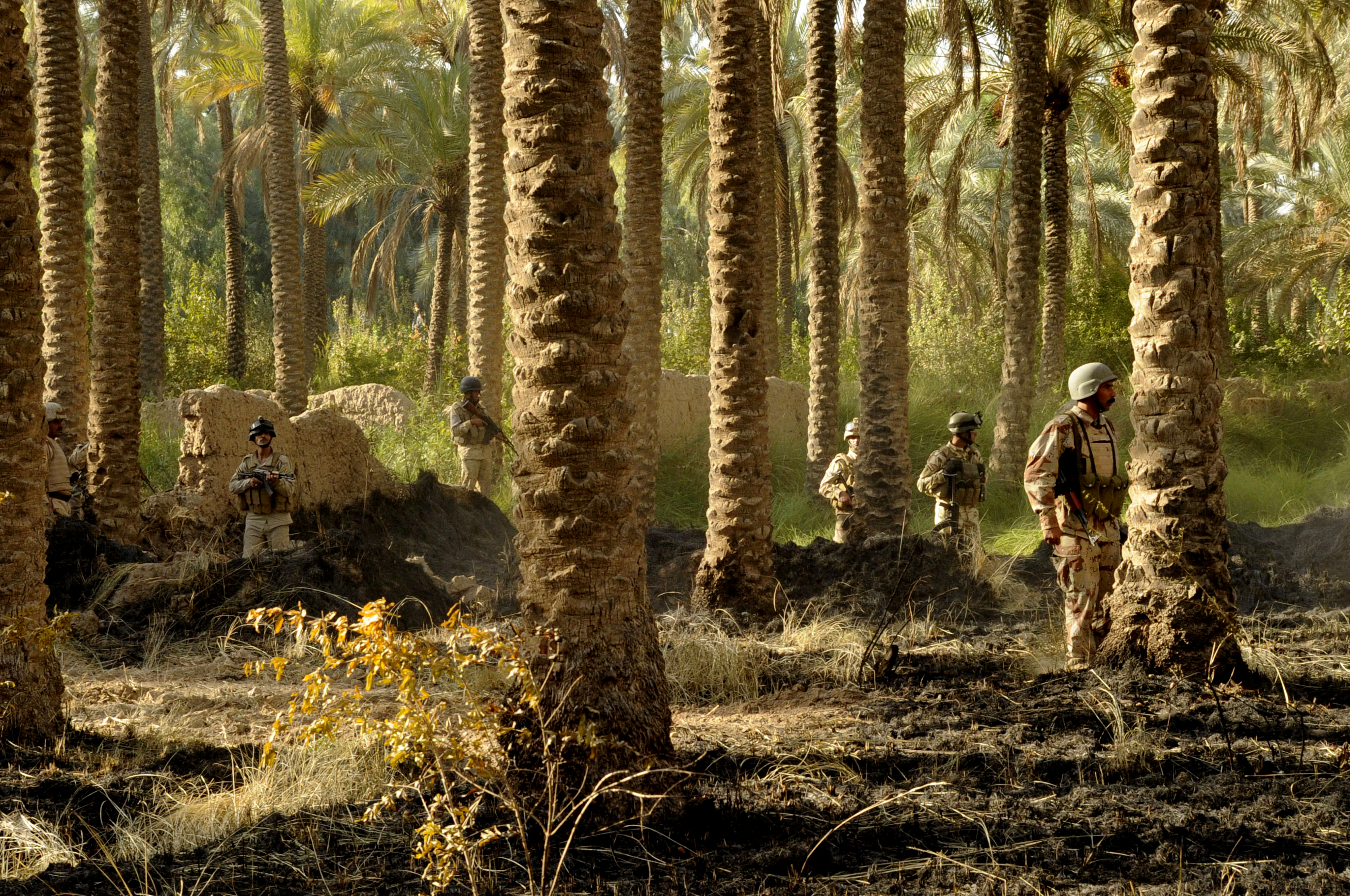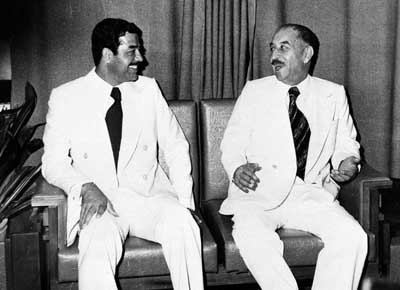|
Abd Al-Baqi Abd Karim Al-Sadun
Abd Al-Baqi Abd Karim Al-Sadun (1947 – 14 December 2021) was an Iraqi politician. He was a member of the Regional Command of the Arab Socialist Ba'ath Party in Iraq, and was responsible for the Ba'ath Party organizations in the south and Diyala Governorate, and a member of the Council of Representatives of Iraq. Life Al-Sadun belonged to the Saadoun clan, and was one of the most prominent Baathist leaders after the fall of Saddam Hussein's regime in 2003, and he was believed to have left for Syria. He was on the U.S. list of most-wanted Iraqis In April 2003, the United States drew up a list of most-wanted Iraqis, consisting of the 55 members of the deposed Ba'athist Iraqi regime whom they most wanted to capture. The list was turned into a set of playing card A playing card is a pi ... until his capture. He was sentenced to death on 11 January 2016. Al-Sadun was admitted to hospital for eye surgery where he died, on 14 December 2021, at the age of 74. References ... [...More Info...] [...Related Items...] OR: [Wikipedia] [Google] [Baidu] |
Arab Socialist Ba'ath Party – Iraq Region
The Arab Socialist Ba'ath Party – Iraq Region ( ''Ḥizb al-Ba‘th al-'Arabī al-Ishtirākī fī al-'Irāq''), officially the Iraqi Regional Branch, was an Iraqi Ba'athism, Ba'athist organisation founded in 1951 by Fuad al-Rikabi. It was the former Ba'athist Iraq, ruling party of Iraq from the 17 July Revolution, 1968 coup until its overthrow by the United States in 2003 during its 2003 invasion of Iraq, invasion of Iraq. This party was the Iraqi regional branch of the Ba'ath Party, original Ba'ath Party, before changing its allegiance to the Ba'ath Party (Iraqi-dominated faction), Iraqi-dominated Ba'ath movement following the 1966 Syrian coup d'état#Intra-Ba'athist split, 1966 split within the original party. The party was officially De-Ba'athification, banned following the American invasion of Iraq in 2003, but despite this it still continues to function underground. History Early years and 14 July Revolution: 1951–1958 The Iraqi Regional Branch of the Ba'ath Part ... [...More Info...] [...Related Items...] OR: [Wikipedia] [Google] [Baidu] |
Diyala Governorate
Diyala Governorate ( ) or Diyala Province is a Governorates of Iraq, governorate in northeastern Iraq. Provincial Government *Governor: Muthanna al-Tamimi *Deputy Governor: Mohammed Jassim al-Jubouri Council Geography Diyala Governorate extends to the northeast of Baghdad as far as the Iran–Iraq border, Iranian border. Its Capital (political), capital is Baqubah. It covers an area of 17,685 square kilometres (6,828 sq mi). A large portion of the province is drained by the Diyala River, a major tributary of the Tigris. Because of its proximity to two major sources of water, Diyala's main industry is agriculture, primarily Phoenix dactylifera, dates grown in large groves. The province also contains one of the largest olive groves in the Middle East. It is also recognized as the Orange (fruit), orange capital of the Middle East. The Hamrin Mountains pass through the governorate. Population The governorate is home to a diverse population of Arabs, Kurds and Ira ... [...More Info...] [...Related Items...] OR: [Wikipedia] [Google] [Baidu] |
Council Of Representatives Of Iraq
The Council of Representatives is the ''de facto'' unicameral legislature of Iraq. According to the Constitution of Iraq, it is the lower house of the bicameral legislature of the country. As of 2020, it comprises 329 seats and meets in Baghdad inside the Green Zone. History The monarchy An elected Iraqi parliament first formed following the establishment of a Mandatory Iraq, constitutional monarchy in 1925. The 1925 constitution called for a bicameral parliament whose lower house, the Chamber of Deputies of Iraq or Council of Representatives (''Majlis an-Nuwwab'') would be elected based on universal manhood suffrage. The upper house, the Senate of Iraq (''Majlis al-A`yan'') was appointed by the king. Sixteen elections took place between 1925 and the coup of 1958. On January 17, 1953 1953 Iraqi parliamentary election, elections for the Chamber of Deputies (also known as the National Assembly) took place. Following controversy over the implementation of the so-called Baghda ... [...More Info...] [...Related Items...] OR: [Wikipedia] [Google] [Baidu] |
Clan
A clan is a group of people united by actual or perceived kinship and descent. Even if lineage details are unknown, a clan may claim descent from a founding member or apical ancestor who serves as a symbol of the clan's unity. Many societies' exogamy rules are on a clan basis, where all members of one's own clan, or the clans of both parents or even grandparents, are excluded from marriage as incest. Clans preceded more centralized forms of community organization and government, and have existed in every country. Members may identify with a coat of arms or other symbol. Etymology The word "clan" is derived from the Gaelic word meaning "children", "offspring", "progeny" or "descendants". According to the ''Oxford English Dictionary'', the word "clan" was introduced into English in around 1406, as a descriptive label for the organization of society in Ireland and the Scottish Highlands. None of the Irish and Scottish Gaelic terms for kinship groups is cognate to English ... [...More Info...] [...Related Items...] OR: [Wikipedia] [Google] [Baidu] |
Saddam Hussein
Saddam Hussein (28 April 1937 – 30 December 2006) was an Iraqi politician and revolutionary who served as the fifth president of Iraq from 1979 until Saddam Hussein statue destruction, his overthrow in 2003 during the 2003 invasion of Iraq, U.S. invasion of Iraq. He previously served as the Vice President of Iraq, vice president from 1968 to 1979 and also as the prime minister of Iraq, prime minister from 1979 to 1991 and later from 1994 to 2003. A leading member of the Ba'ath Party, Arab Socialist Ba'ath Party, he espoused Ba'athism, a mix of Arab nationalism and Arab socialism, while the policies and political ideas he championed are collectively known as Saddamism. Born near the city of Tikrit to a Sunni Islam, Sunni Arabs, Arab family, Saddam joined the revolutionary Ba'ath Party in 1957. He played a key role in the 17 July Revolution that brought the Ba'athists to power and made him Vice President of Iraq, vice president under Ahmed Hassan al-Bakr. During his tenure ... [...More Info...] [...Related Items...] OR: [Wikipedia] [Google] [Baidu] |
Syria
Syria, officially the Syrian Arab Republic, is a country in West Asia located in the Eastern Mediterranean and the Levant. It borders the Mediterranean Sea to the west, Turkey to Syria–Turkey border, the north, Iraq to Iraq–Syria border, the east and southeast, Jordan to Jordan–Syria border, the south, and Israel and Lebanon to Lebanon–Syria border, the southwest. It is a republic under Syrian transitional government, a transitional government and comprises Governorates of Syria, 14 governorates. Damascus is the capital and largest city. With a population of 25 million across an area of , it is the List of countries and dependencies by population, 57th-most populous and List of countries and dependencies by area, 87th-largest country. The name "Syria" historically referred to a Syria (region), wider region. The modern state encompasses the sites of several ancient kingdoms and empires, including the Eblan civilization. Damascus was the seat of the Umayyad Caliphate and ... [...More Info...] [...Related Items...] OR: [Wikipedia] [Google] [Baidu] |
1947 Births
It was the first year of the Cold War, which would last until 1991, ending with the dissolution of the Soviet Union. Events January * January–February – Winter of 1946–47 in the United Kingdom: The worst snowfall in the country in the 20th century causes extensive disruption of travel. Given the low ratio of private vehicle ownership at the time, it is mainly remembered in terms of its effects on the railway network. * January 1 – The ''Canadian Citizenship Act, 1946, Canadian Citizenship Act'' comes into effect, providing a Canadian citizenship separate from British law. * January 4 – First issue of weekly magazine ''Der Spiegel'' published in Hanover, Germany, edited by Rudolf Augstein. * January 10 – The United Nations adopts a resolution to take control of the free city of Trieste. * January 15 – Elizabeth Short, an aspiring actress nicknamed the "Black Dahlia", is found brutally murdered in a vacant lot in Los Angeles; the mysterious case is never solv ... [...More Info...] [...Related Items...] OR: [Wikipedia] [Google] [Baidu] |
2021 Deaths
This is a list of lists of deaths of notable people, organized by year. New deaths articles are added to their respective month (e.g., Deaths in ) and then linked below. 2025 2024 2023 2022 2021 2020 2019 2018 2017 2016 2015 2014 2013 2012 2011 2010 2009 2008 2007 2006 2005 2004 2003 2002 2001 2000 1999 1998 1997 1996 1995 1994 1993 1992 1991 1990 1989 1988 1987 1986 Earlier years ''Deaths in years earlier than this can usually be found in the main articles of the years.'' See also * Lists of deaths by day * Deaths by year (category) {{DEFAULTSORT:deaths by year ... [...More Info...] [...Related Items...] OR: [Wikipedia] [Google] [Baidu] |
Members Of The Regional Command Of The Arab Socialist Ba'ath Party – Iraq Region
Member may refer to: * Military jury, referred to as "Members" in military jargon * Element (mathematics), an object that belongs to a mathematical set * In object-oriented programming, a member of a class ** Field (computer science), entries in a database ** Member variable, a variable that is associated with a specific object * Limb (anatomy), an appendage of the human or animal body ** Euphemism for penis * Structural component of a truss, connected by nodes * User (computing), a person making use of a computing service, especially on the Internet * Member (geology), a component of a geological formation * Member of parliament * The Members, a British punk rock band * Meronymy, a semantic relationship in linguistics * Church membership, belonging to a local Christian congregation, a Christian denomination and the universal Church * Member, a participant in a club or learned society A learned society ( ; also scholarly, intellectual, or academic society) is an organizat ... [...More Info...] [...Related Items...] OR: [Wikipedia] [Google] [Baidu] |
Iraqi Military Leaders
Iraqi or Iraqis (in plural) means from Iraq, a country in the Middle East, and may refer to: * Iraqi people or Iraqis, people from Iraq or of Iraqi descent * A citizen of Iraq, see demographics of Iraq * Iraqi or Araghi (), someone or something of, from, or related to Persian Iraq, an old name for a region in Central Iran * Iraqi Arabic, the colloquial form of Arabic spoken in Iraq * Iraqi cuisine * Iraqi culture *The Iraqis (party), a political party in Iraq *Iraqi List, a political party in Iraq *Fakhr-al-Din Iraqi, 13th-century Persian poet and Sufi. See also * List of Iraqis * Iraqi diaspora * Languages of Iraq There are a number of languages spoken in Iraq, but the lingua franca; Mesopotamian Arabic (also known as Iraqi Arabic) is by far the most widely spoken in the country. Contemporary language The most widely spoken language in Iraq is the Arabi ... * {{disambiguation Language and nationality disambiguation pages ... [...More Info...] [...Related Items...] OR: [Wikipedia] [Google] [Baidu] |
Military Leaders Of The Iraq War
A military, also known collectively as armed forces, is a heavily armed, highly organized force primarily intended for warfare. Militaries are typically authorized and maintained by a sovereign state, with their members identifiable by a distinct military uniform. They may consist of one or more military branches such as an army, navy, air force, space force, marines, or coast guard. The main task of a military is usually defined as defence of their state and its interests against external armed threats. In broad usage, the terms "armed forces" and "military" are often synonymous, although in technical usage a distinction is sometimes made in which a country's armed forces may include other paramilitary forces such as armed police. Beyond warfare, the military may be employed in additional sanctioned and non-sanctioned functions within the state, including internal security threats, crowd control, promotion of political agendas, emergency services and reconstruction, ... [...More Info...] [...Related Items...] OR: [Wikipedia] [Google] [Baidu] |





